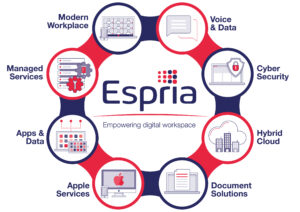Flexibility in the workplace has certainly seen an increase over recent years, but nothing could have prepared us for the challenges of this year with the pandemic.
Many businesses may have had certain security policies in place regarding home working, but even those with policies will not have been prepared for whole workforce becoming remote. This has challenged even the most prepared companies.
As a result of COVID-19, there have certainly been spikes in cyber-attacks and whilst we have all survived two lockdowns, we may not be allowing our teams to return to the office immediately or may be continuing with a hybrid solution of some remote and some office based. So how do you protect your remote working teams and ensure that you are cyber secure?
What are the dangers?
On-line work in general increases the potential for cyber-attacks. Whilst we are working in the office environment, we are protected by our IT blacklisting distrusted IP addresses, firewalls. With our ever-increasing reliance on technology, we become more vulnerable. Work tasks are completed online and that can compromise the security of your business.
Hackers can try and crack your passwords for instance and this is particularly easy if you use the same password for multiple on line apps-these are the apps that your teams could be using to stay in touch with other team members.
The Ciso Benchmark report for 2020 identified that businesses are struggling to manage remote workers particularly on mobile/phone devices. In fact, 52% of respondents said that mobile devices were the most challenging to protect!
Phishing emails are another method that hackers use to infiltrate your security. They can trick your teams into handing over personal details or more importantly, click on links or download malicious attachments. Many of these phishing emails are also targeting people’s fear over COVID-19 and another study showed that since February, there has been a 600% increase in Phishing emails!
The most common concern though must be from employees using their own devices to work from at home and this most certainly spiralled when the pandemic hit.
What security measures can you put into place?
As much as possible, you should ensure that your teams are working from work devices only so that they are subject to remote access security and implementation of a two-factor password would be advisable to mitigate any risk of hackers gaining any access to your systems.
Implement anti-malware software and update any applications with security measures. This means that your IT department will have complete sight of your organisations IT infrastructure and will have the ability to monitor any malicious security.
Risk Control
It is advisable that you create a remote working policy which should essentially contain the following:
- The creation and maintenance of strong passwords
- Acceptable policy on websites viewed when not viewing them for company work.
- Guidance on storing devices securely
- Use of devices in public places.
Whilst these polices will help in the short term through the pandemic, these are policies that you should keep going forward.
If you need help supporting your teams whilst working remotely then contact our team today.
Many businesses may have had certain security policies in place regarding home working, but even those with policies will not have been prepared for whole workforce becoming remote. This has challenged even the most prepared companies.


